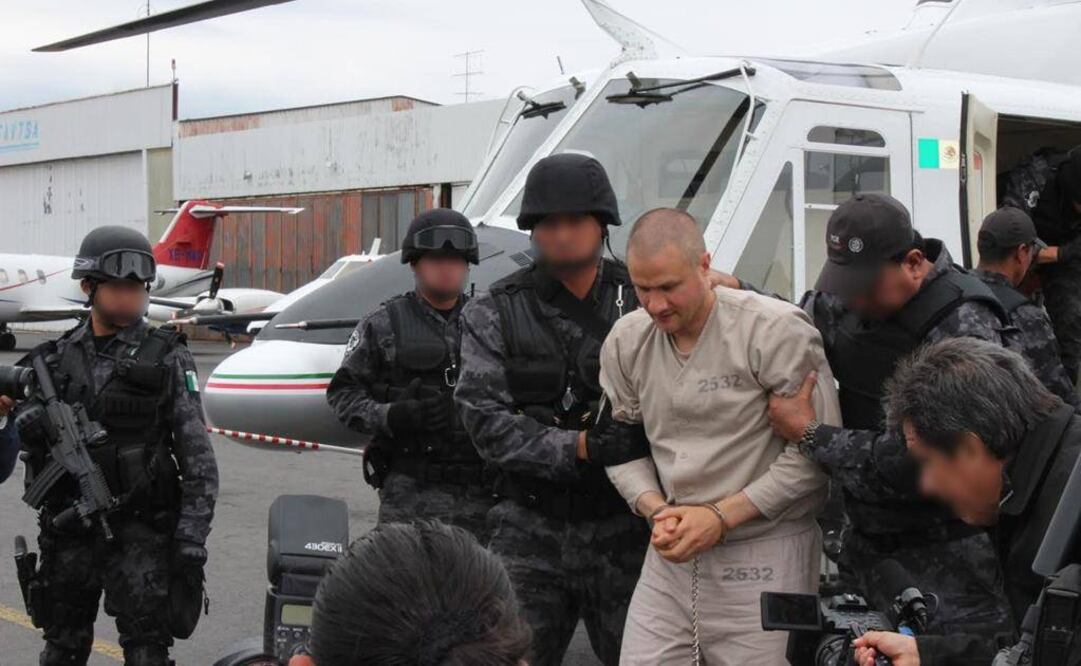Más Información

Tren Interoceánico: Sheinbaum asegura que habrá reparación integral del daño a víctimas; avanza FGR con investigación

Hasta 400 mil pesos recibirán familiares de fallecidos en el Tren Interoceánico; deberán presentar boleto para cobrar seguro

Accidente del Tren Interoceánico deja a Doña Jovita sin dos hijas y un yerno; "querían ir a conocer y pasear", menciona

Fiscalía de Veracruz ha usado el delito de terrorismo en al menos cuatro casos; organizaciones condenan uso para inhibir el ejercicio periodístico
Mexico has extradited 13 people to the United States, including two top drug traffickers, because of a new streamlined process between the two countries - and not because of the recent escape of Joaquín "El Chapo" Guzmán, officials said.
José Alberto Rodríguez, head of the international section of Mexico's Attorney General's Office, denied on Thursday that the extraditions were a response to the embarrassing July 11 escape from prison by Guzmán, Mexico's most-wanted drug lord.
The extradition of 13 people in one day was the largest since President Enrique Peña Nieto took office in December 2012. Rodríguez told The Associated Press that the extraditions had been in the works long before Guzmán's escape, and that U.S. and Mexican authorities had earlier agreed to speed up the process.
"With or without the escape of 'El Chapo' Guzmán, these extraditions were going to happen," Rodríguez said.
A U.S. Justice Department statement said Wednesday's extraditions were part of a new effort at coordination against organized crime that arose from a June meeting between U.S. Attorney General Loretta Lynch and her Mexican counterpart, Arely Gómez.
Many experts agreed there was no direct relation with the Guzmán case; extradition requests can take years to complete. But they suggested the timing could be attributed to rule-of-law problems that Mexico has been experiencing, illustrated by Guzmán's escape and the 2013 release from prison of Rafael Caro Quintero, the man convicted in the 1985 killing of U.S. DEA agent Enrique Camarena, despite having charges pending against him in the U.S.
Mexico also just passed the one-year anniversary of the disappearance of 43 teachers' college students at the hands of local police. Their whereabouts remain a mystery.
"I can't help but question if the timing of this was a way to deflect in the press from all the other things going on," said Juan Masini of Masini Global Group, a former Justice Department official at the U.S. Embassy in Mexico City.
Other experts saw the extraditions as a sign Mexico realizes it needs its neighbor's help on security issues. When Peña Nieto took office, his administration reversed the open cooperation that Washington experienced under former President Felipe Calderón. The number of extraditions dropped and access to Mexican officials was reduced.
Extraditions fell from 115 in Calderon's last year to 54 in the first year of Peña Nieto's administration.
"For those who felt relations had gone downhill, that drop in extraditions seemed to be significant," said David Shirk, associate professor in the Department of Political Science and International Relations at the University of San Diego.
Among those sent to the U.S. were Edgar Valdez Villarreal, known as "La Barbie," a top lieutenant to the late Arturo Beltran Leyva who later led his own faction of the Beltran Leyva cartel, and Jorge Costilla Sánchez, known as "El Coss," an alleged former leader of the Gulf Cartel and the Zetas.
The group also included José Emanuel García Sota, who is charged in the 2011 killing of U.S. Immigration and Customs Enforcement agent Jaime Zapata. Three suspects charged in the March 2010 murders of U.S. Consulate employees in Ciudad Juárez also were sent to the U.S.
Rodríguez said the streamlined extradition process speeds some administrative steps, but because suspects have the right to appeal, extraditions still take at least a year.
He also said that Mexico will still make sure its own authorities have obtained all the information from the suspects needed to solve local crimes before sending them north.
The United States filed an extradition request for Guzman about 2½ weeks before his escape. His lawyer told several media outlets in August that his flight was a direct result of learning that extradition had become imminent.
Some analysts say the recent extraditions cannot be understood without considering Guzmán's escape.
"It's clearly a recognition on the part of the Mexican government that they can't depend on their prison system after El Chapo, they don't want a future embarrassment," said Duncan Wood, director of the Mexico Institute at the Wilson Center. "They're being forced to accept that it's better for them if their criminals are in the U.S."
Noticias según tus intereses
[Publicidad]
[Publicidad]










